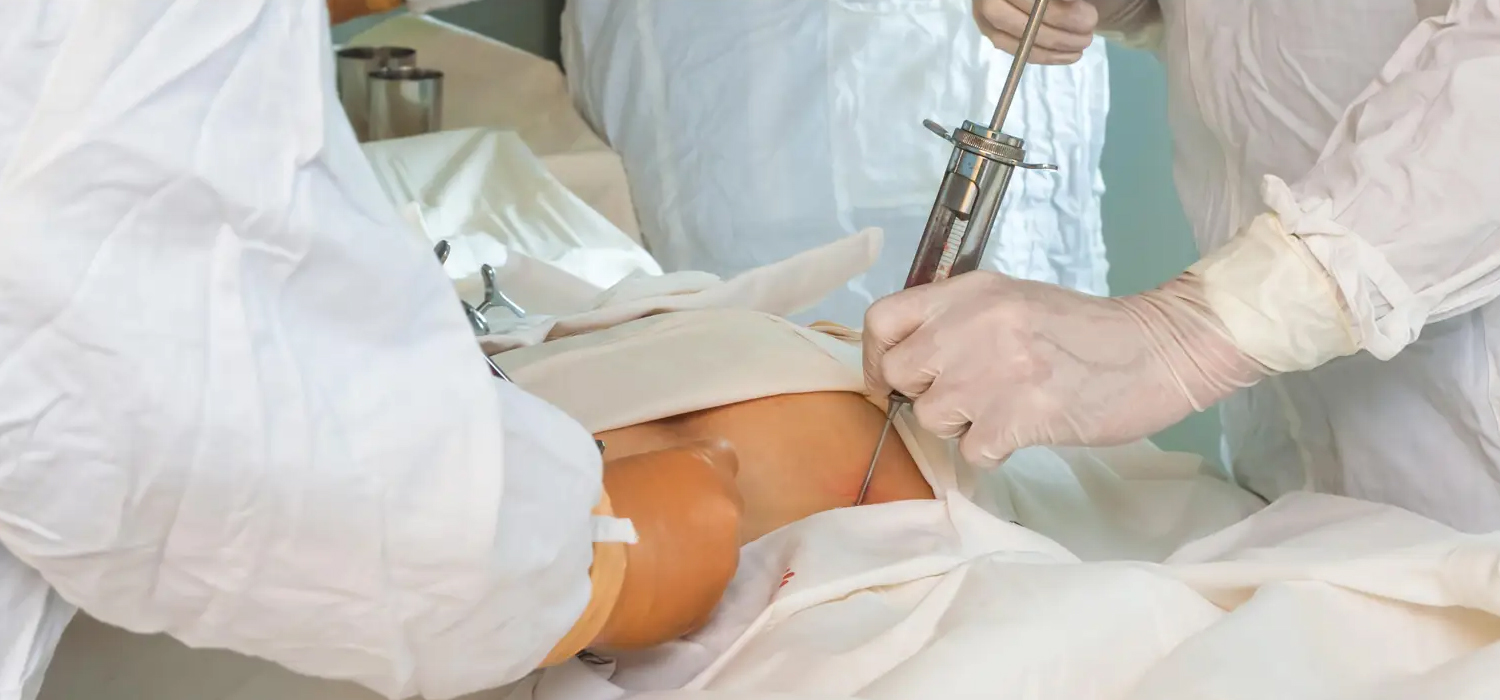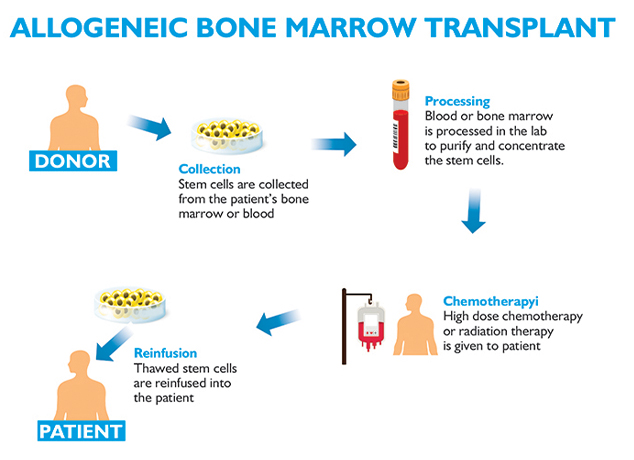
Bone Marrow Transplant In Gurgaon
Bone marrow transplant (BMT) is a special therapy for patients with certain cancers or other diseases. A bone marrow transplant in gurgaon involves taking cells that are normally found in the bone marrow (stem cells), filtering those cells, and giving them back either to the donor (patient) or to another person.
The goal of Bone marrow transplant is to transfuse healthy bone marrow cells into a person after his or her own unhealthy bone marrow has been treated to kill the abnormal cells. Bone marrow transplant has been used successfully to treat diseases such as leukemias, lymphomas, aplastic anemia, immune deficiency disorders, and some solid tumor cancers since 1968.
What is Bone Marrow?
Bone marrow is the soft, spongy tissue found inside bones. It is where most of the body's blood cells develop and are stored. The blood cells that make other blood cells are called stem cells. The most primitive of the stem cells is called the pluripotent stem cell.
The following diseases are the ones that most commonly benefit from Bone Marrow Transplant in Gurgaon:
- Leukemias
- Severe aplastic anemia
- Lymphomas
- Multiple myeloma
- Immune deficiency disorders
- Some solid-tumor cancers (in rare circumstances)
The Bone Marrow Transplant Treatment in Gurgaon and Procedure
The preparations for a bone marrow transplant vary depending on the type of transplant, the disease needing transplant, and your tolerance for certain medicines.
This intense therapy is required to effectively treat the malignancy and make room in the bone marrow for the new cells to grow. This therapy is often called ablative, or myeloablative, because of the effect on the bone marrow.
Ablative therapy prevents this process of cell production and the marrow becomes empty. An empty marrow is needed to make room for the new stem cells to grow and establish a new blood cell production system.
The stem cells find their way into the bone marrow and begin reproducing and growing new, healthy blood cells.
This includes frequent blood tests, close monitoring of vital signs, strict measurement of fluid input and output, daily weigh-ins, and providing a protected and clean environment. The days before bone marrow transplant treatment are counted as minus days. The day of transplant is considered day zero. Engraftment and recovery following the transplant are counted as plus days.
The day of transplant is numbered zero. Days +1, +2, etc, will follow. There are specific events, complications, and risks associated with each day before, during, and after transplant.
What are the Types of Bone Marrow Transplant?
The type of bone marrow that is used for the transplant distinguishes the different types of BMT.
Autologous BMT is done by using the patient's own stem cells.
- Allogeneic BMT involves using the stem cells of a donor. It may be
- Matched related , where donor is HLA matched relative, usually sibling
- Matched unrelated where donor is not a relative of a patient and usually found from one of the various national or international registries.
- Partially matched related - donor is from patient's family but partially matched (haploidentical)

What are the phases of BMT ?
There are three main phases to the BMT process, which will review here:�

Although the experience during these phases may be quite different for each patient, a general overview is provided.
Process of Bone Marrow Transplant Treatment in Gurgaon
For your transplant journey, the process of bone marrow transplant in gurgaon is divided into five steps that guide a patient. The steps begin with how to prepare for the journey and include what to expect along the way.
- Preparation
The preparation phase begins when the patient arrives at the bone marrow transplant in gurgaon centre and begins the process of medical evaluation, orientation, informed consent, and other preliminary activities like :
1. Complete discussion regarding the procedure and its complications.
2. Central Venous Catheter Evaluation and insertion.
3. Bone Marrow/Stem Cells Harvest. - Conditioning
The conditioning phase begins the actual bone marrow transplant treatment in gurgaon process. Patient is admitted and during this phase, high-dose chemotherapy, radiation therapy, or both are initiated. Chemotherapy and radiation therapy are given in doses that obliterate the marrow function and result in the greatest possibility of destroying the disease. - Transplant
The transplant phase is actually short and involves the infusion of donor bone marrow or stem cells. After the conditioning regimen is completed, the patient receives the infusion of bone marrow or stem cells over half to one hour like blood transfusion. - Engraftment and Early Recovery
Approximately 10 to 28 days after transplant, signs that the new bone marrow or stem cells are engrafting (growing and developing) can be expected. Close monitoring will continue along with supportive care. Preparation for the return of the patient to the referring physician or centre will begin. - Long Term Recovery
The long term recovery phase involves leaving the treatment center,dealing with any ongoing clinical issues, and re-establishing life patterns. Patients need to follow up for long term complications of BMT.
Who requires BMT?
Conditions for which hematopoietic stem cell transplant is offered.
- Thalassemia, sickle cell anemia, transfusion dependent anemia
- Aplastic anemia
- Fanconi anemia, pure red cell aplasia
- Metabolic disorders
- Immunodeficiency states
- Multiple Myeloma
- Hodgkin Lymphoma
- Non-Hodgkin Lymphoma
- Acute Lymphoblastic leukemia (ALL)
- Acute Myeloid Leukemia (AML)
- Chronic Myeloid Leukemia (CML)
- Myelodysplastic syndrome.
Is BMT a surgery like kidney transplant?
No, Bone Marrow Transplant is a medical procedure. Mostly, stem cells are collected via peripheral vein and the whole procedure is like donating blood or platelet. In some patients Bone marrow harvest is done which involves general anaesthesia to the donor.
Are there any risks of Bone Marrow Transplant in Gurgaon?
Yes, Bone marrow transplant in gurgaon is a complex procedure that carries significant risks of serious complications.
Generally, the risks are reduced if:
- You are young - studies have shown the younger you are, the more likely the treatment is to succeed
- You receive stem cell donation from a sibling (brother or sister)
- You have no serious health conditions (apart from the condition you're being treated for)
The major problem with stem cell transplants is the recipient's ability to withstand high doses of chemotherapy (and sometimes radiotherapy), which are often needed before the transplant.
The main risks associated with a bone marrow transplant are discussed below.
- Graft versus host disease
In some cases, the transplanted cells (graft cells) recognise the recipient's cells as "foreign" and try to attack them. This is known as graft versus host disease (GvHD) and often occurs after stem cell transplantation. GvHD is the most common complication seen in Allogenic BMT. About 40% of the patients develop GvHD.
There are two types of GvHD:
1. Acute GvHD :
which usually occurs during the first three months following the transplant. It may involve skin (generalized rash or itching), Gut (diarrhoea or abdominal pain), liver (jaundice)
2. Chronic GvHD :
can develop at any time between three months and two years after the transplant. The symptoms can persist or may come and go for many years. They can range in severity from mild to life-threatening. Patient can have dry eyes ,joint pain, skin changes, breathing difficulty, difficulty in swallowing. It develops from acute GvHD and can cause symptoms for many years - Infection
After having a bone marrow transplant, your risk of developing an infection will increase. This is because the conditioning you receive before the transplant will weaken your immune system. The risk of infection may be increased further if you need to take immune suppressants.
It's very important to prevent infections developing. If you get an infection it could quickly develop into a more serious condition, such as a lung infection (pneumonia).
What are the chances of success after Bone Marrow Transplant in Gurgaon?
You get the best bone marrow transplant in gurgaon at a 90% success rate.
This usually depends on diseases. For autologous BMT, success rates are close to 90%. For thalassemia success rates are 80%.
Why is it so costly?
Bone marrow transplant involves giving high dose chemotherapy to the patient. Donor also receives some injections called growth called growth factors. Stem Cell collection requires apheresis which requires a dedicated blood bank support. However, the most part of BMT is management of post transplant drop in blood counts which may require high grade antibiotics and antifungals. Therefore, BMT is usually done in HEPA filtered rooms to reduce incidence of infections.
Is there any risk to donor?
No, there are risks to donor. BMT is an extremely safe procedure for the donor; risk of complications being very small. Most of the times donor may have some bodyache which can be managed by paracetamol tablet alone.
Can donor go back to work after procedure?
Ideally donor should stay near bone marrow transplant in gurgaon centre for a week or so after transplant as patient may require platelet support from his donor.
What if my patient does not have a matched sibling?
Other options are matched unrelated donor and partially matched sibling donor transplant. However, cost can significantly go up in matched unrelated donor transplant because of costs involved in procuring stem cells from a registry. Partially matched transplant is another option but it involves increased risk of GvHD and infections.
Will patient ever lead a normal life?
Yes, patient can return to his normal routine in 6 months - 1 year post successful transplant. However, he needs to follow up with transplant centre as advised.
What about post BMT follow up?
It depends upon the disease and type of transplant whether autologous or allogenic. In case of autologous transplant, patient needs to follow up for around 1-2 months, whereas in Allogenic transplant at least 3 months follow up is necessary. In case patient develops any complications a longer follow up is required.
Speciality of the Bone Marrow Transplant in Gurgaon
- The Centre is equipped with ultra modern infra structure and internationally trained widely experienced faculty.
- Team of trained and dedicated BMT nurses.
- Large spacious rooms with High Efficiency Particulate Air filter (HEPA filter) with positive pressure for protective isolation so that risk of infections is minimised.
- Medical and paediatric Intensive care unit with isolation beds.
- Round the clock services for blood components.
- Day Care facility for outpatient chemotherapy/ Immunotherapy/ blood transfusions.
- Gamut of support services
- Excellent administrative services like appointment, billing and admissions are managed by dedicated standalone teams.
Best Bone Marrow Transplant in Gurgaon is now available at Dr Gaurav Dixit's clinic.
Make Appoinment